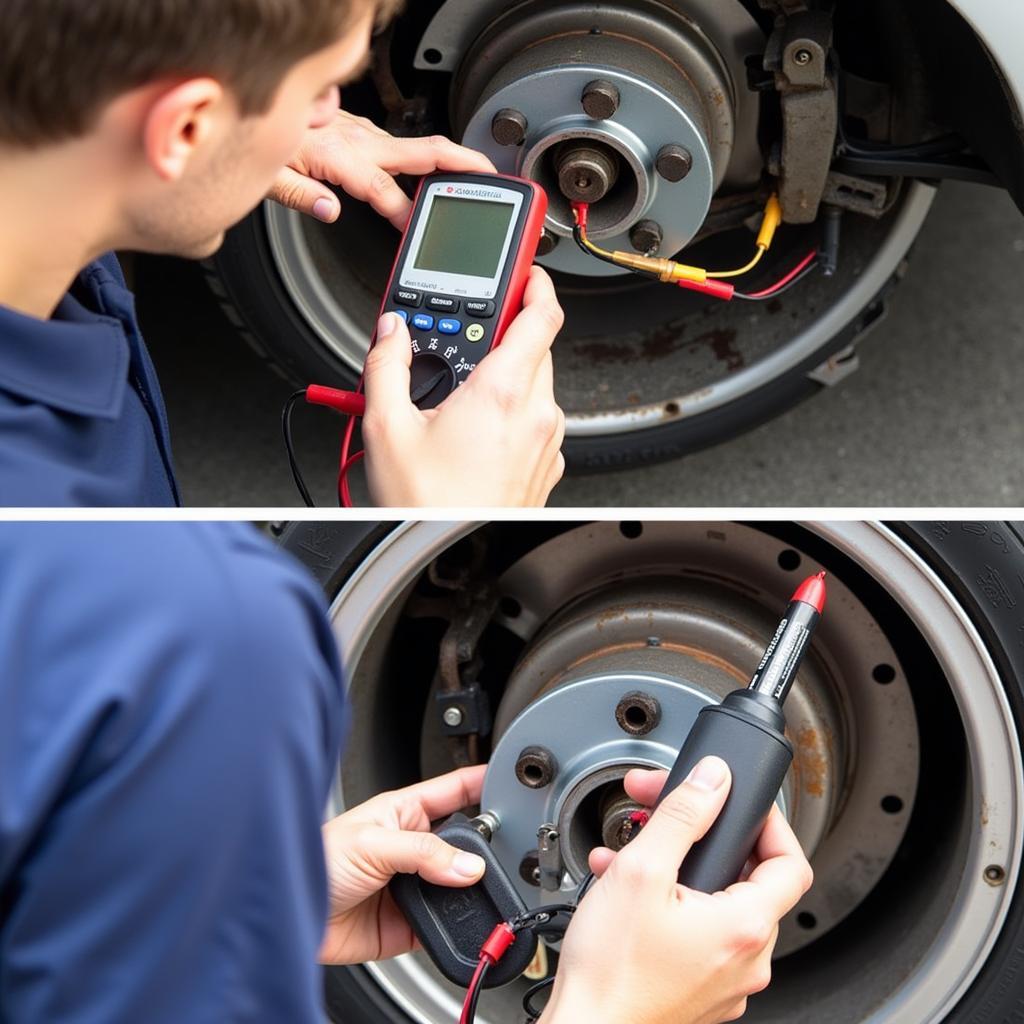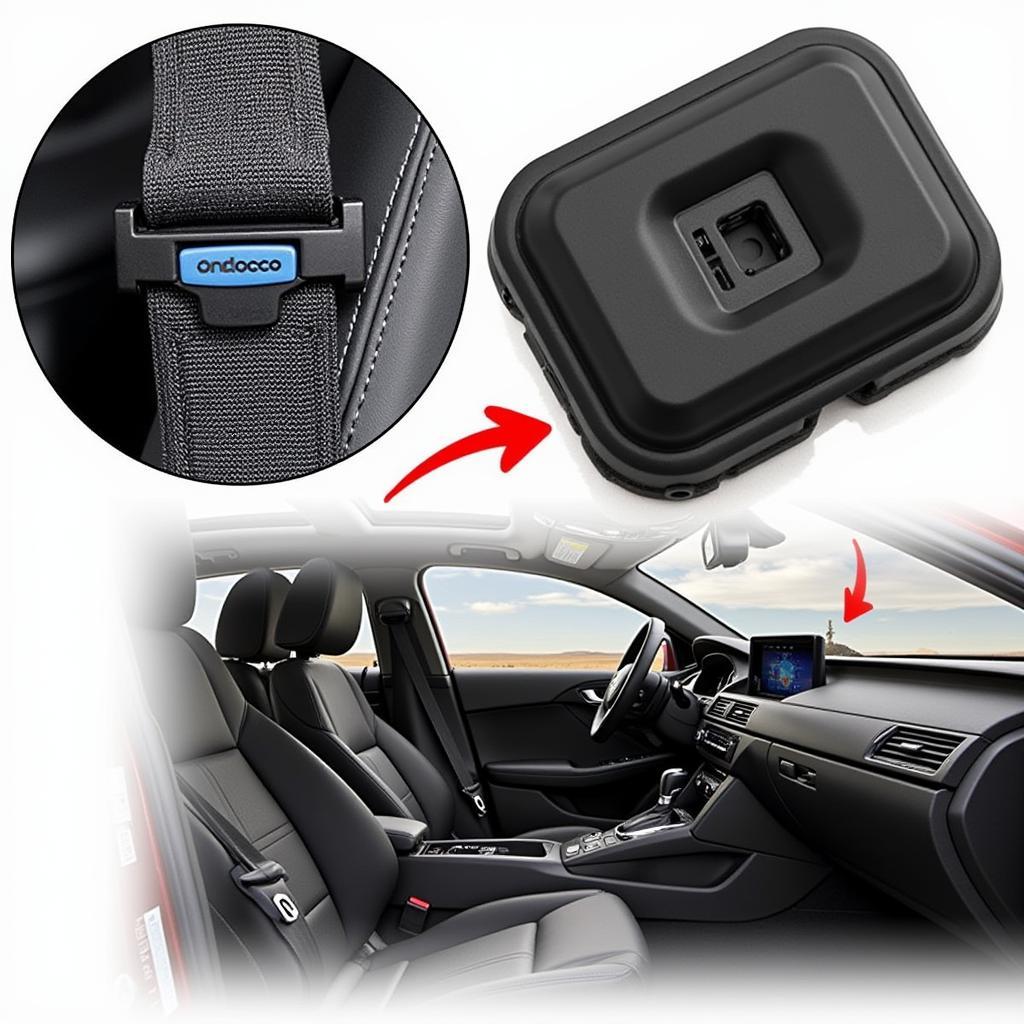A “brake system BMW warning” light illuminating on your dashboard can be a nerve-wracking experience. This warning signifies an issue with your BMW’s sophisticated braking system, urging your immediate attention. While it might seem daunting, understanding the potential causes and solutions can equip you with the knowledge to address the situation effectively.
Decoding Your BMW Brake System Warning
Your BMW employs a network of sensors and systems to ensure optimal braking performance. When the “brake system warning” light appears, it triggers a cascade of questions:
- What does the warning light specifically indicate?
- Is it safe to continue driving?
- What are the potential causes and solutions?
This comprehensive guide delves into the common causes behind a “brake system BMW warning,” empowering you with the knowledge to navigate this situation safely and confidently.
Common Causes of a Brake System BMW Warning
## Worn Brake Pads
One of the most frequent culprits behind a “brake system BMW warning” is worn brake pads. Brake pads are designed to wear down over time due to friction generated during braking. When the friction material reaches a critically low level, a sensor within the brake pad assembly triggers the warning light.
Expert Insight: “Regular brake pad inspections are crucial for maintaining optimal braking performance and safety,” says Jake Miller, Senior Automotive Technician at Bavarian Autohaus. “Worn brake pads not only compromise braking efficiency but can also lead to costly damage to brake rotors.”
## Low Brake Fluid Level
Brake fluid is the lifeblood of your BMW’s braking system, responsible for transmitting hydraulic pressure from the master cylinder to the brake calipers. A drop in brake fluid level could indicate a leak within the system, which needs immediate attention.
Remember: Never attempt to drive your BMW if you suspect a brake fluid leak. Contact a qualified mechanic or your BMW dealership immediately.
## Brake Sensor Malfunction
 Faulty Brake Sensor
Faulty Brake Sensor
While less common, a malfunctioning brake sensor can also trigger the “brake system BMW warning.” Brake sensors are responsible for monitoring various parameters within the braking system, including brake pad wear and brake fluid level. If a sensor fails, it might send erroneous signals to the vehicle’s control unit, leading to the warning light illuminating.
Addressing a Brake System BMW Warning
Experiencing a “brake system BMW warning” can be unsettling, but understanding the potential causes and taking appropriate action can help mitigate risks:
- Consult your BMW’s owner’s manual: This valuable resource provides specific information about your car’s warning lights and recommended actions.
- Exercise caution: If the warning light appears while driving, reduce speed gradually and safely pull over to the side of the road.
- Assess the situation: If you suspect low brake fluid or a brake fluid leak, do not attempt to drive the vehicle. Contact a qualified mechanic or your BMW dealership for assistance.
- Seek professional help: If you are unsure about the cause of the warning or how to address it, it is always recommended to seek professional assistance from a qualified BMW technician.
Preventative Measures for a Healthy Brake System
Proactive maintenance can significantly reduce the likelihood of encountering a “brake system BMW warning” light:
- Adhere to BMW’s recommended brake fluid flush intervals: Regular brake fluid flushes ensure optimal fluid condition and prevent corrosion within the braking system.
- Inspect brake pads regularly: Routine inspections can identify wear and tear early on, allowing for timely replacement and preventing damage to other brake components.
- Address warning lights promptly: Ignoring warning lights can exacerbate existing issues and lead to more costly repairs down the line.
Conclusion
A “brake system BMW warning” should never be ignored. Understanding its implications and taking prompt action ensures your safety and the longevity of your vehicle’s braking system. By following the guidelines outlined in this article and seeking professional assistance when needed, you can confidently address this common BMW issue and continue enjoying the thrill of the drive.
FAQs
1. Can I drive my BMW with the brake system warning light on?
It is not recommended to drive your BMW with the brake system warning light on. The severity of the underlying issue dictates the safest course of action. If you suspect low brake fluid or a leak, do not attempt to drive the vehicle.
2. How often should I replace my BMW’s brake pads?
Brake pad lifespan varies depending on driving habits and conditions. As a general guideline, it is recommended to have your brake pads inspected every 15,000-20,000 miles.
3. How much does it cost to fix a brake system issue in a BMW?
The cost of repair depends on the specific issue and the labor rates in your area. It is always recommended to obtain a diagnosis and quote from a reputable BMW specialist before proceeding with any repairs.
4. Can I reset the brake system warning light myself?
While it is possible to reset the brake system warning light in some BMW models, it is not recommended unless you have identified and addressed the underlying issue.
5. What should I do if the brake system warning light comes on after a brake job?
If the warning light illuminates after a brake job, it could indicate an issue with the installation or a potential sensor malfunction. It is crucial to have the work inspected by a qualified technician to ensure proper installation and address any potential problems.

